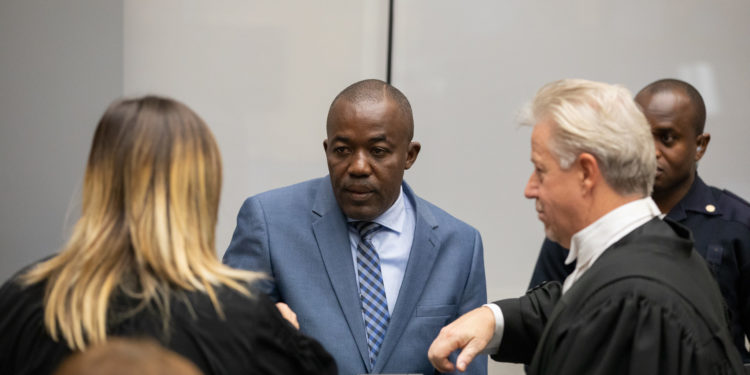By Thomas Verfuss in The Hague
Sealed indictments by international courts – or “secret indictments” as press and public often call them – can hamper the work of defence teams and thus jeopardize the right of a suspect to a fair trial. This is stated by the defence team of Alfred Yékatom, the first war crimes suspect from the Central African Republic who came into the custody of the International Criminal Court, in 2018.
It can be concluded from circumstances that there must be other CAR suspects wanted by the ICC than Yékatom and his co-detainee in The Hague, Patrice-Edouard Ngaïssona, who was arrested later in 2018. Potential Central African witnesses for the Yékatom defence don’t want to talk to the lawyers for fear of incriminating themselves, in case they are subject to a “secret arrest warrant” too and might end up one day in The Hague.
The defence team writes in a submission to the judges: “On the other hand, the defence is prejudiced by maintaining the identities of the co-suspects under seal because persons who the Defence have sought to interview in preparation of the confirmation hearing have been reluctant to cooperate, speculating that they are the ones named in the arrest warrant. These persons do not want to prejudice their own “case” by providing an interview to the defence.”
The sealed indictments were invented at the International Criminal Tribunal for the Former Yugoslavia, the first contemporaneous international criminal court and thus the predecessor of the ICC, by Louise Arbour, who was chief prosecutor of the ICTY from 1996 till 1999. The ICTY was then in a situation similar to the ICC now: there were many outstanding arrest warrants, partly against high-level suspects, but there had not been arrests for quite some time. So there was little trial activity, as at the ICC now: the Ongwen trial, the only one ongoing, will be over in a couple of months, and if they charges against Yékatom and Ngaïssona and Malian suspect Al Hassan are not confirmed, in the foreseeable future, there will be no trial activity left.
So Arbour resorted to the sealed indictments to facilitate and encourage arrests. UN troops that were present in various parts of the former Yugoslavia, could use the element of surprise when executing the arrest warrants. This led to a new series of arrests soon.
This course of events shows, by the way, why the “popular” expression secret arrest warrant is not precise. “They are not put into a drawer because that would make no sense”, the then ICTY spokesman said. They are just sealed from the public’s (and the suspect’s) eyes, but shared with relevant actors like states and international organisations that can help execute the arrest warrants.
This way sealed arrest warrants can help the functioning of international courts, but also jeopardise the principle of fair trials, one of the cornerstones of (international) courts, as the Yékatom defence now alleges. According to Peter Robinson, co-counsel for Yékatom, it is the first time this point is raised by a defence team – at least to this knowledge, the US lawyer said in response to a question by JFJ.
Yékatom and Ngaïssona are the first suspects from the CAR in custody of the ICC. Prosecutor Fatou Bensouda wants them to stand trial for crimes against humanity and war crimes like murder, torture, mutilation, deportation, pillaging, enrollment of child soldiers and attacks on humanitarian missions during the bloody sectarian violence in 2013 and 2014. The hearings on the confirmation of charges are due to start on September 19.







